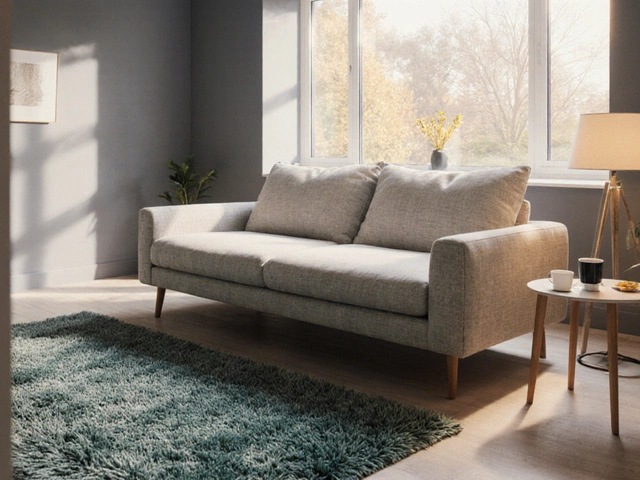Ever wake up after a night on the couch and wonder why your back feels like it’s made of wood? Couch sleeping is way more common than most of us admit, whether it’s because of a guest situation, a late movie, or just pure exhaustion. But your body definitely notices the difference.
Sofas just aren’t designed for a good night’s sleep, and it shows. Most couches slope in weird places or have cushions that don’t support your body evenly. You might think one night won’t make a difference, but even short stints can leave you with stiff shoulders, sore hips, and awkward neck pain. Ever tried fitting a six-foot frame onto a five-foot couch? It’s a leg curl you never wanted.
Before you turn your couch into a makeshift bed again, let’s talk about what actually happens when you sleep there too often. There are tricks to make it less miserable, but knowing the trade-offs can save you a ton of discomfort—and maybe an expensive trip to the chiropractor.
- Physical Discomfort: Stiffness and Aches
- Sleep Quality and Restlessness
- Wear and Tear on Your Couch
- Hidden Health Risks
- Smart Tips for Occasional Couch Sleepers
Physical Discomfort: Stiffness and Aches
Sleeping on a couch sounds cozy at first, but your body usually pays the price. Sofas aren’t built for sleeping; they’re made for short-term sitting. The surface is often too uneven or too soft in some spots and way too firm in others. When you stretch out across a couch cushion, you don’t get the support your spine needs, and that’s how those annoying aches and stiffness creep in.
There’s real science behind this discomfort. Back and neck pain are the top complaints from people using a sleeping couch more than a few nights here and there. Mattresses are made to keep your body in a healthy alignment, but on a sofa, your neck and lower back usually twist in weird angles. This can mess up your posture overnight, making you wake up feeling older than you are.
Arms and legs don’t get off easy either. Most couches have raised edges or armrests that cut into your side, block your legs, or leave your feet dangling. Lack of space means you’re forced to curl up or sleep at an angle, neither of which feels good by morning. There’s also that feeling of pins and needles from poor blood flow if you get stuck in a cramped position for hours.
- If you sleep on sofas often, you’re at higher risk for tight hip flexors and stiff shoulders, as your body can’t fully relax.
- Cushions lose firmness and start sagging after ongoing use, which only increases the discomfort as time goes on.
- People with pre-existing issues (like sciatica or arthritis) often find their pain gets worse after couch sleeping—even for one night.
If you have no choice but to crash on the couch, throw a firm blanket under you or use extra pillows for support. Try to keep your spine as straight as possible, even if it means lying diagonally or tucking a cushion between your knees. The more support you add, the less your body will complain in the morning.
Sleep Quality and Restlessness
If you’ve tried sleeping on a couch and felt like you just ran a marathon in your sleep, you’re not alone. The main problem with using a sleeping couch is that it constantly interrupts your rest. Most couches don’t give you enough room to move around naturally, and that throws off your normal sleep cycle.
Deep sleep needs comfort and room to move, but most sofas are too short or narrow. If you’re taller than average, your body curls or twists in odd ways just to fit. This can make you wake up multiple times a night, and those interruptions add up fast. In fact, research from the National Sleep Foundation shows that people need about 7-9 hours of good-quality sleep, and broken sleep makes you feel tired even when you technically spend enough time in bed (or on a couch).
Here’s a quick look comparing beds to couches for sleep quality:
| Feature | Bed | Couch |
|---|---|---|
| Size | Queen/Full (60"x80"/54"x75") | Average Sofa (72"-84" long, 30"-36" deep) |
| Support | Even, designed for sleep | Inconsistent, breaks between cushions |
| Freedom to Move | Plenty | Limited |
| Tossing/Turning Wakes You | Less frequent | Much more frequent |
Ever notice how you wake up the moment you turn and nearly fall off the edge? That’s because the couch is fighting your body’s natural motion. Being cramped or held in one position all night can make you restless, and your sleeping couch habit starts to mess with how refreshed you feel in the morning.
Apart from comfort, consider that most couches trap body heat and don’t let air circulate like mattresses do. Overheating makes you toss and turn more, and can mess with deep REM sleep, the part you need to feel alert the next day.
If you still need to crash on the sofa, use a fitted sheet to cover cracks between cushions and grab extra pillows to support your neck or back. But if you find yourself restless after couch nights, your body isn’t being dramatic — it’s just plain uncomfortable.

Wear and Tear on Your Couch
Using your sofa bed as your primary sleep spot always comes at a cost—mainly to the couch itself. Sofas aren’t built for nightly, full-body weight the way a real mattress is, so you’re basically accelerating its breakdown every time you snooze there. Cushions flatten, springs lose their bounce, and you’ll start to see permanent saggy spots where you always lie. It’s not just slightly lumpy cushions—it’s the foundation underneath taking a hit, which you can often spot after just a few weeks of regular couch sleeping.
Fabric suffers too. Oils from your skin and sweat work their way into the upholstery, leading to stains and weird smells. If your couch is leather, expect cracks and discoloration to show up faster than normal. And if you’re dealing with microfibre or other synthetics, embedded dirt gets almost impossible to clean out once it’s been pressed down night after night.
All this wear doesn’t just look bad—it can cost you money. According to a 2024 survey from a major furniture chain, sofas used regularly for sleeping needed professional cleaning or repair 2.5 times more often than those used for sitting only. Replacing sunken cushions and restuffing a seat can set you back anywhere from $100 to $400, depending on brand and material. New fabric or upholstery? That’s easily $700 or more.
Check out this quick breakdown:
| Damage Type | Signs | Potential Cost |
|---|---|---|
| Cushion sagging | Sunken appearance, uneven feel | $100 - $400 |
| Fabric wear/staining | Discoloration, odors, surface tears | $75+ (professional cleaning) |
| Frame/spring damage | Noisy, creaky sofa, loss of support | $200 - $500 |
| Upholstery replacement | Visible rips or heavy stains | $700+ |
If you have to sleep on the couch from time to time, try rotating the cushions, use a fitted sheet, and don’t skip weekly cleaning. These quick fixes help a bit, but nothing totally stops the wear if your sofa stays your main bed. Long story short: regular sleeping on your couch almost always ends with having to replace or repair it way sooner than you’d like.
Hidden Health Risks
Sleeping on a couch seems harmless at first, but there’s more going on than meets the eye. A lot of the health risks sneak up slowly—the damage adds up over weeks or months. The big one? Your spine. Couch cushions usually sag or dip in the middle, which throws your back out of whack. If you crash there night after night, you’re stacking the deck for chronic back pain and even nerve issues.
Another thing people forget: couches aren’t built with clean sleep in mind. Allergens like dust mites and pet dander love to hide out in all that cushy fabric. If you wake up stuffy or with itchy eyes, your couch is likely part of the problem, especially if you’re sensitive to allergies. You might even notice your breathing feels off—couches just don’t offer the same ventilation a bed and mattress do.
- If you have acid reflux or GERD, a soft, slouchy couch will send stomach acid creeping up toward your throat. Your body doesn’t stay in the right position when you’re half-reclined all night.
- People with circulation issues, like diabetes or varicose veins, risk swollen feet or numb arms because it’s easy to end up twisted or cramped in a weird spot. Good luck waking up without tingling fingers if you fall asleep with your arm tucked behind a throw pillow.
Kids and older folks are even more likely to feel these downsides. Seniors, especially, are at risk for falls when getting up from a low, soft sofa, and an awkward night on a couch can amp up joint stiffness for days. For kids, developing bodies need good support, and a lumpy couch just isn’t going to cut it.
| Health Issue | How the Couch Makes It Worse |
|---|---|
| Chronic back pain | Poor support, sags, and misalignment |
| Allergies | Dust, pet hair, trapped dander |
| Acid reflux | Lying at odd angles, slouching |
| Poor circulation | Cramped positions, pressure points |
| Falls (seniors) | Low seat height, soft surface |
Honestly, no sofa bed can cover up all these problems if it’s used as your main sleeping spot. If you have to crash on a couch, keep an eye out for these symptoms, and don’t shrug off weird aches or new allergy problems—they might just be coming from your favorite living room hangout.

Smart Tips for Occasional Couch Sleepers
If you end up on the couch now and then, you don’t have to suffer. The right moves will keep you from waking up in pain or tossing all night. Let’s keep things practical and break down what actually works.
- Sofa bed trumps regular couches for sleep. If you have a pull-out, use it. Those mattresses are actually designed for sleeping, and you’ll notice the difference instantly.
- If you’re stuck with a regular couch, grab a mattress topper or even a thick comforter. This helps keep your spine straighter and pads those annoying cushion gaps. If you have a camping mat, that actually works in a pinch too.
- Support matters. Pillows aren’t just for your head—stick one between your knees (side sleepers) or under them (back sleepers). This keeps your body lined up and takes pressure off your lower back, which is key for avoiding aches.
- Keep a blanket handy, even in summer. Sleep drops your body temperature. Couches don’t hold heat like beds, so you can get chilled fast. A lightweight throw does the trick.
- Clean your space. Couches collect crumbs, dust, and, let’s face it, pet hair. Dust and allergens spike overnight and can mess with your breathing. Quick vacuum or a lint roller goes a long way for comfort.
Sometimes it’s the little things that add up, like shutting off that power strip behind the couch so you’re not staring at little blinking lights. And if your couch sags a lot, slide a folded blanket or towel under the worst dip to even things out.
A quick look at what seasoned couch-sleepers say actually improves comfort and health:
| Tip | Impact | Difficulty |
|---|---|---|
| Mattress topper or thick blanket | Reduces pressure on joints | Easy |
| Pillow between knees/under legs | Spine alignment, less pain | Very Easy |
| Regular cleaning | Better breathing, fewer allergies | Moderate |
| Blanket/throw | Stay warm, better sleep | Easy |
| Evening out the cushions | Flatter surface, more comfort | Very Easy |
If you keep these tips in mind, the couch won’t wreck your night—or your back. Just don’t make a habit of it. Sleep experts usually agree: your own bed still wins every time.





